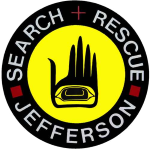JSAR was paged just before 5 PM on Sunday to a reported subject located near the top of Mt Townsend who had fallen and was unconscious, not breathing properly, with possible leg fractures and a head injury.
With cloud cover intensifying over the area, Jefferson County Sheriff’s Office immediately requested helicopter support in hopes of reaching the subject while weather permitted. They also advised the state that assistance from other SAR units may be needed if rescue by air was not possible.
EMTs from Quilcene Fire Rescue went up the trail with medical gear to attempt to reach the subject. Four JSAR volunteers responded to the trailhead and followed the fire units with a wheeled litter in case ground rescue was required. The requested helicopter arrived in the area and began searching the upper portion of Mt Townsend for the subject, since we had no more exact location available.
Shortly after JSAR started up the trail, the helicopter crew from Naval Air Station Whidbey Island Search and Rescue reestablished radio contact and stated that they had reached the patient, who was being packaged by a Navy paramedic. The pilot soon advised they were returning to pick up the packaged patient, then several minutes later that everyone was on board and en route to Harborview Medical Center.
The NASWI SAR crew reported after the call that there were cloud layers around 5000 and 8000 feet. The two peaks of Mt Townsend are between 6200 and 6300 feet.
JSAR would like to take this opportunity to note that this was the last of many saves for a flight medic who has been present on many of our most major missions (and others throughout the region) for the past five years. While we will not name him here, he has been a part of the exemplary record of NASWI SAR assistance to local search-and-rescue organizations, bringing paramedic skills and advanced-life-support equipment directly to the scene via the highly skilled pilots and crews of the MH-60S Seahawks based on Whidbey Island. The NASWI SAR team has made the difference between good and bad patient outcomes on many occasions. Thank you for your service.
